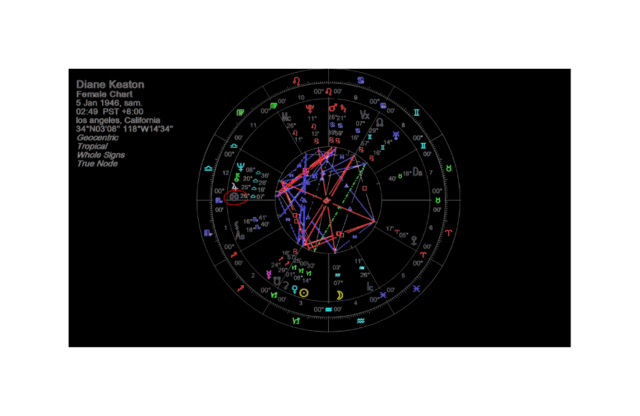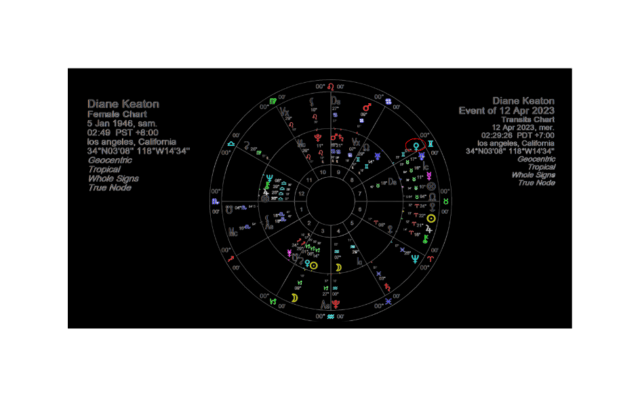No products in the basket.
The money axis in astrology & how to time money-making opportunities using your birth chart
Dear NightFall Astrology readers,
This is a topic in astrology that interests all of us. Indeed, one of the most famous quotes about astrology was attributed to one of the wealthiest men of the 20th century – J.P. Morgan – who had famously said: “Millionaires don’t use astrology, billionaires do”.
I wanted to write an article that will help you identify income streams in your astrology chart and use transits to time money-making opportunities. I’ll also share tips on elevating your mindset and consciousness around wealth creation.
I. The money axis in the birth chart: 2nd & 8th houses:
In this section, we’ll talk about the second and eighth houses and the way that their rulers are placed in a chart. Reading a chart comes from seeing the houses, the areas of life, identifying the whole sign house, and seeing where the ruler of that house is placed. This will connect one house with another house and allow for a story to form.
The second house is all about your day-to-day spending and income. How do you earn your money? And more importantly, how do you spend it? This house offers insights into your direct financial situation, including your paycheck, bills, and regular expenses. On the other hand, the eighth house delves into your more long-term financial goals and investments. It’s where you’ll find information about assets like your stock portfolio, crypto holdings, and any artwork or jewellery you see as an investment. It’s also where you’ll find information about your debts, loans, taxes, and money owed to others.
So, whether you’re a penny-pinching master or a big spender, the placement of planets in these houses can give you a deeper understanding of your financial habits and goals. With this knowledge, you can make more informed decisions about your finances and work towards a more prosperous future.
The placement of planets in our second and eighth houses holds great significance in the realm of finance. These planets can provide valuable insight into our monetary situation, including our income, investments, and financial goals. For instance, the presence of Venus or Jupiter in the second or eighth house is a promising sign of a robust financial setup. On the other hand, the placement of Mars or Saturn in these houses may indicate a more conservative approach or financial challenges.
The impact of these planetary positions is contingent upon one’s unique birth chart, as the interplay between the planets can be either constructive or challenging. For example, a Venus placement in a night chart is likely to have a more favourable outcome, while a Mars placement in a day chart may prove to be more arduous. In sum, exploring the influence of planetary alignments in our birth chart can offer a nuanced understanding of our financial mindset and potential for prosperity.
The initial step is to identify the presence of growth-oriented or challenging planets to assess the financial outlook of the second and eighth houses.
Drawing from my experience as a professional astrologer, I’ve noticed in several clients’ charts that despite having Mars in a day chart in the eighth house, it does not automatically signify a dismal financial fate. However, its presence may indicate potential hurdles in this domain, particularly when malefic planets are involved.
Once the planetary influence is established, the next step is to consider the signs in these houses. Mutable signs, characterised by their adaptable and restless nature, are transitional points between seasons and reflect a propensity towards diversified streams of income and investment portfolios. This may manifest in the form of side hustles or multiple revenue sources, resulting in a broad and eclectic financial landscape.
Having a mutable sign for your second and eighth houses suggests that you need multiple sources of income rather than relying on just one. If a fixed sign rules your second or eighth house, you can expect reliable, consistent income from a single source through your career or investments. In contrast to the mutable sign’s ability to focus on a variety of topics at once, the cardinal sign’s energy will be more focused on pursuing a single goal until exhaustion sets in. A cardinal sign will initiate a process and then hand off the task to another sign to complete. So, it’s not the same sort of power. While fixed signs tend to be more settled in their careers, cardinal signs tend to stick with the same field for a long time but start new projects or streams of income that they eventually hand off to others.
For example, if you have Uranus in the second or eighth house can indicate volatility in your finances. Neptune in these houses can suggest a spiritual approach rather than a clear budget. Pluto intensifies whatever it’s placed with. The sign of the second or eighth house can also reveal the type of income you prefer. For example, a Gemini second house may crave variety, while a Taurus second house might prefer hands-on work. Check for any planets in these houses for further insights into how you make money.
It’s important to keep in mind the difference between the planets in a house and the planet that rules the house. The planets in a house give information about that part of life. The planet that rules that whole sign house and its condition describes the overall outcome or how it pans out. So, planets in a house are not as important. The planet ruling that house, how it is placed, and its condition will tell you the final outcome and the area of life that it is connected to.
The next step is to look at the planetary rulers of the second and eighth houses.
For example, I have Sagittarius in my second house (whole sign house). Jupiter rules Sagittarius. Where is Jupiter in my chart? It’s exalted in Cancer in my ninth house of faith, international matters and travel, foreign languages, morality and belief systems, law, and higher education. So, it shows that my second house of income is tied to faith, international matters and law. I’m an international lawyer and professional astrologer who speaks fluently 4 languages. You do the same assessment with your eighth house.
To recap, identify the sign and its ruling planet in the second house. Ignore planets in the house when evaluating the final outcome of that house.
I also want to be clear about the difference between career houses and money houses since not everyone’s job is their main source of income. So, check where the ruler of your 10th house or Midheaven is. That might differ from where the ruler of your second or eighth house is. Because of this, it might look like you work in one industry, but your income comes from a different part of that industry. For example, I have the ruler of my Leo Midheaven as the Sun. My Sun is in the 10th house, so it’s not tied to any of the money houses. It simply shows that I’m a creative leader in my own career (entrepreneur). However, my eighth house ruler (Mercury) is near my Midheaven, confirming, even more, the entrepreneurship part as I and others invest in my career. I also deal with other people’s issues in both my careers (lawyer and astrologer); that’s another eighth-house indicator.
If your second or eighth house ruler resides in the 10th house or is near your Midheaven, it is likely that your daily income is provided by your career. While this connection may not necessarily dictate a separate source of income, it could indicate the specific role or department within the industry that supports your career. Alternatively, inheritance or a partner’s financial contribution may be the primary source of income, and for some, caring for the household and raising a family may be their occupation. I hope this sheds some light on the matter.
{ For a more detailed insight into all the 12 astrological houses, you can refer to my free article on the subject. }
II. 3 levels of consciousness related to money:
Money, a fascinating and dynamic concept, represents a particular form of energy that possesses the power to transmute into any material form, be it tangible or experiential. As a testament to its undeniable influence, the origins of money can be traced back to the innovative minds of the Phoenicians, who introduced this revolutionary invention to the world.
We can summarise people’s different mindsets and relationships with money into three levels of consciousness.
(i) The lowest level dictates that money is the root of all evil, a harbinger of insurmountable problems, and a perpetual source of dissatisfaction. Such convictions, woven into the fabric of our societal norms, are often handed down from generation to generation, ensnaring countless individuals in their deceptive grip. This insidious pattern is intimately linked to a survival mindset. For those held captive by such limiting beliefs, pursuing financial abundance is a never-ending struggle, a fruitless endeavour that only perpetuates their self-imposed scarcity.
(ii) Believing that money is merely a means to cover basic expenses, afford occasional leisurely escapes, or obtain some desirable possessions is certainly a more optimistic outlook than the former. This belief system suggests a degree of prudence and mindfulness in financial matters as we strive to allocate our resources judiciously. However, the crux of the issue lies in the disheartening disbelief that we can transcend the mundane and ascend to greater heights of achievement and prosperity. Such a mindset emanates an aura of self-defeat, sabotaging our ability to reach our full potential and relegating us to a life of mediocrity. It is, in essence, a crippling energy that must be overcome to attain the pinnacle of success.
(iii) In contrast to the previous mindsets, there are those who were fortunate enough to imbibe a deep reverence, admiration, and gratitude for the power of money from an early age. This disposition is markedly distinct from the corrosive nature of greed. In this instance, their upbringing and environment have been instrumental in shaping their financial outlook. These individuals possess a resolute vision that perceives various entrepreneurial endeavours and ventures as the gateway to self-liberation and advancement, viewing money as a potent tool for personal growth and transformation. Consequently, they tend to attract the most propitious opportunities, buoyed by a can-do attitude that is instrumental in paving the way towards success.
Regarding the first two mindsets, a pivotal moment presents itself to those who are ready to transcend their limited beliefs and embrace a more prosperous path. It is the moment of realisation, of self-reflection, of asking the right questions – “How did the affluent ascend to such heights? Surely, not all of them are devious and dishonest; there must be some method to their success.” This moment marks a veritable turning point in one’s life, the day when everything changes, and a fresh, exhilarating journey begins. The process of deprogramming the mind from such entrenched beliefs is arduous. Still, the rewards are manifold, offering new horizons of growth, prosperity, and fulfilment that surpass the previous state of stagnation.
How does this work in practice?
Undoubtedly, dispelling the deep-seated, erroneous beliefs that have tethered us to mediocrity for years cannot be accomplished overnight. It is a process that may take years of persistent effort, and the initial step of visualising and erasing these false notions from our mental screen is perhaps the most daunting. Replacing such negative thoughts with affirmative ones requires daily practice, steadfast determination, and unwavering commitment.
To break free from this conditioning, we must first acknowledge that we know very little about money and recognise the need to start afresh from stage 0, as depicted in the Tarot’s “Fool” card – the card of necessary risk. The Fool stands at the edge of a precipice, poised to take a leap of faith into the unknown. This concept of embracing risk is critical to building a new vision and a new life.
However, navigating this transformative journey may necessitate the guidance of a life coach, a therapist, or an astrologer to help us relinquish our limiting beliefs. While self-discipline may suffice for some, others may require more comprehensive support. Ultimately, the efficacy of this process rests on the individual’s level of self-awareness and personal inclinations.
III. Astrological Transits: Unlocking the Optimal Moment to Seize Money-Making Opportunities:
Financial literacy and investment strategies are specialised topics that are best left to financial experts. However, in this context, we will delve into a distinct method of utilising astrological cycles and timing to our advantage, drawing on the unique characteristics of our birth chart.
You’ll need to pull up your chart in whole-sign houses for these techniques. Here’s the link to my free birth chart calculator that’s already set on this house system: https://nightfallastrology.com/birth-chart-calculator/.
There are essentially three main timing techniques:
(i) When the Moon crosses/conjoins your “lot of fortune”. This is often called the “part of fortune” or “fortune” (it looks like a cross in a circle, see Diane Keaton’s chart below). There are multiple names; look for “fortune” when pulling up a bi-wheel chart (your natal chart with the transits can be found on Google easily).

The Moon is usually the day’s events, and the lot of fortune is good luck just kind of falling your way. On the day/hour/minute when the Moon is crossing my lot of fortune, I’m looking to invest in my (home) office (my part of fortune is in Aquarius in my 4th house).
So, it’ll always be some new type of gadget for my desk, a software, or an online course (Aquarius rules technology and higher intellect/knowledge, and the ruler of my lot of fortune is Saturn in my 3rd house of communication).
The important part is to do something that you want good luck for.
(ii) When the Moon moves into your second or eighth houses. These are the houses of income (2nd house) and investments (8th house).
When the Moon is in those houses, it’s great energy to take action towards making money, whatever that means for you.
(iii) Even better is when Venus is in your second or eighth house or the entire few months to a year when Jupiter’s in those houses.
For example, in April 2023, Venus will be transiting Diane’s 8th house of investments (see her bi-wheel transit chart below).

There you have it! I hope this was helpful! Let me know your thoughts in the comments down below!
Thank you for reading.
Fuel my caffeine addiction and spark my productivity by clicking that ‘Buy me a coffee’ button—because nothing says ‘I love this blog’ like a hot cup of java!
Buy Me a Coffee
Your Astrologer – Theodora NightFall ~
Your next 4 steps (they’re all essential but non-cumulative):
Follow me on Facebook & Instagram!
Subscribe to my free newsletter, “NightFall Insiders”, the place where the most potent magicK happens, and get my daily & weekly horoscopes, exclusive articles, updates, and special offers delivered directly to your inbox!
Purchase one of my super concise & accurate mini-readings that will answer your most pressing Astro questions within 5 days max!
Book a LIVE Astro consultation with me.











